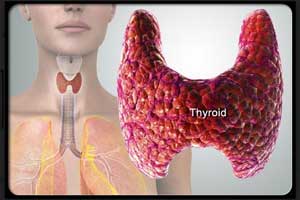- Home
- Editorial
- News
- Practice Guidelines
- Anesthesiology Guidelines
- Cancer Guidelines
- Cardiac Sciences Guidelines
- Critical Care Guidelines
- Dentistry Guidelines
- Dermatology Guidelines
- Diabetes and Endo Guidelines
- Diagnostics Guidelines
- ENT Guidelines
- Featured Practice Guidelines
- Gastroenterology Guidelines
- Geriatrics Guidelines
- Medicine Guidelines
- Nephrology Guidelines
- Neurosciences Guidelines
- Obs and Gynae Guidelines
- Ophthalmology Guidelines
- Orthopaedics Guidelines
- Paediatrics Guidelines
- Psychiatry Guidelines
- Pulmonology Guidelines
- Radiology Guidelines
- Surgery Guidelines
- Urology Guidelines
Thyroid disorders may worsen heart failure : Circulation Study

Pennsylvania, Philadelphia: Thyroid disorders -- low T3 syndrome and subclinical hypothyroidism – might worsen heart failure, finds a new study published in the Circulation: Heart Failure.
The thyroid gland is a tiny powerhouse, located at the base of the neck. It releases hormones that control how the entire body uses energy and affects an array of organs throughout the body – including the heart.
Subclinical hypothyroidism is a mild form of hypothyroidism or underactive thyroid. Both it and low T3 syndrome occur when the body doesn't produce enough of certain hormones.
Subclinical hypothyroidism isn't typically treated with thyroid hormone pills because the thyroid is still functioning properly overall. For low T3 syndrome, also known as a euthyroid sick syndrome, treating the condition with thyroid hormone pills is considered controversial.
Anne Cappola, an endocrinologist at the Perelman School of Medicine at the University of Pennsylvania in Philadelphia, and colleagues conducted the study to examine the prevalence of thyroid dysfunction and associations with cardiovascular outcomes in a large, prospective cohort of outpatients with preexisting heart failure.
Also Read: Greater thyroid ultrasound use linked to increased thyroid cancer incidence
"These findings suggest there are groups of people who might benefit from thyroid treatment who aren't getting treated right now," said Dr. Cappola.
For the study, the researchers analyzed collected data on 1,365 patients with heart failure. It consisted of mostly white men aged 57 years old, on average -- enrolled between 2003 and 2011 in the Penn Heart Failure Study. Most of the participants did not have severe heart failure.
Researchers tested the thyroid hormones in blood samples provided by participants at the start of the study. Most had normal thyroid hormone levels, but 5 percent had subclinical hypothyroidism and 14 percent had low T3 syndrome.
Also Read: New treatment for resistant hypothyroidism found
Key Findings:
- After about four years, compared with heart failure patients whose thyroids functioned normally, those with subclinical hypothyroidism or low T3 syndrome were more likely to need a mechanical pump that supports heart function and blood flow (a ventricular assist device) or a heart transplant.
- Compared with heart failure patients whose thyroids functioned normally, those with subclinical hypothyroidism or low T3 syndrome also had a higher risk of death.
- Isolated low T3 was also associated with heart failure.
In 2013, the American Heart Association issued guidelines recommending that doctors test thyroid hormone levels in all patients with heart failure. The guidelines, however, don't define abnormal thyroid levels or give specific advice for treating heart failure patients with possible thyroid problems.
"In patients with preexisting heart failure, subclinical hypothyroidism with TSH ≥7 mIU/L and isolated low T3 levels are associated with poor prognosis," concluded the authors. "Clinical trials are needed to explore the therapeutic effects of T4 and T3 administration in heart failure."

Disclaimer: This site is primarily intended for healthcare professionals. Any content/information on this website does not replace the advice of medical and/or health professionals and should not be construed as medical/diagnostic advice/endorsement or prescription. Use of this site is subject to our terms of use, privacy policy, advertisement policy. © 2020 Minerva Medical Treatment Pvt Ltd